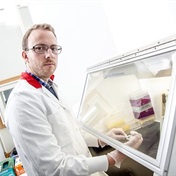On November 20, scientists led by Shinya Yamanaka of Kyoto University reported how they reprogrammed human skin cells to become indistinguishable from stem cells taken from human embryos.
Stem cells are primitive cells that eventually turn into any of the 220 different types of cells in the human body.
They have aroused huge interest. The great hope is that one day stem cells, grown in a lab dish, can be coaxed into differentiating into specific adult cells, thus becoming transplant tissue to replenish organs ravaged by disease.
Yamanaka's breakthrough would notably mean that stem cell researchers can sidestep the seething ethical controversy that comes from using embryonic stem cells, the most potent stem cell of all.
No more tumours for lab mice
In further research, unveiled on Friday by the journal Nature
Biotechnology, Yamanaka's team report that they can now produce these
so-called induced pluripotent stem cells, or iPS cells, without having
to resort to a cancer gene found to cause tumours in many of the lab
mice in the earlier experiment.
If confirmed, it will remove a significant safety hazard in using these cells in transplants one day.
In the original research, Yamanaka used a retrovirus to deliver four genes, including the cancer gene c-Myc, into skin cells.
The gene delivery in essence "reprogrammed" these cells so that they lost their specialised adult functions and become primitive and versatile, functioning like embryonic stem cells.
This time, the team used only three genes, leaving out c-Myc, in a bid to find whether this would still induce the reprogramming yet also reduce the cancer risk.
The main test involved mice that had been engineered to have specialised cells that were derived from the iPS cells.
At a 100-day deadline in the experiment, none of the 26 mice with iPS cells that had been derived without c-Myc, died of tumours.
But among mice that had iPS cells which had been derived with c-Myc, six of the 37 animals died of tumours.
Yamanaka's team also created human iPS cells from a skin sample taken from a 36-year-old adult.
High quality cells
The cells were of high quality, but without c-Myc, the efficiency of
iPS cell generation "decreased substantially," they write.
"In approximately half the experiments, we were not able to obtain human iPS cells when transduction with the Myc retrovirus was omitted," they say.
The next step is to find a way of increasing generation of iPS stem cells by using a safe substitute for c-Myc.
One of the big pluses from Yamanaka's work is that it could one day allow doctors to create stem cells that bear the patient's genetic code, thus eliminating the risk that if these cells are transplanted they will be attacked as alien by the body's immune system.
In an interview with AFP earlier this week, Yamanaka cautioned it would take time to put the research to practical use.
"The goal is far off in the distance," he said.
Yamanaka also said embryonic stem cells, despite the controversies surrounding them, would still have to be used for a while.
"Scientists have to continue embryonic stem cell research as it would take some time for us - at least a year, I would say - to prove [iPS] safety in research on monkey cells," followed by tests on human cells, he said. - (Sapa/AFP)
Read more:
New stem cell discovered
December 2007




 Publications
Publications
 Partners
Partners














